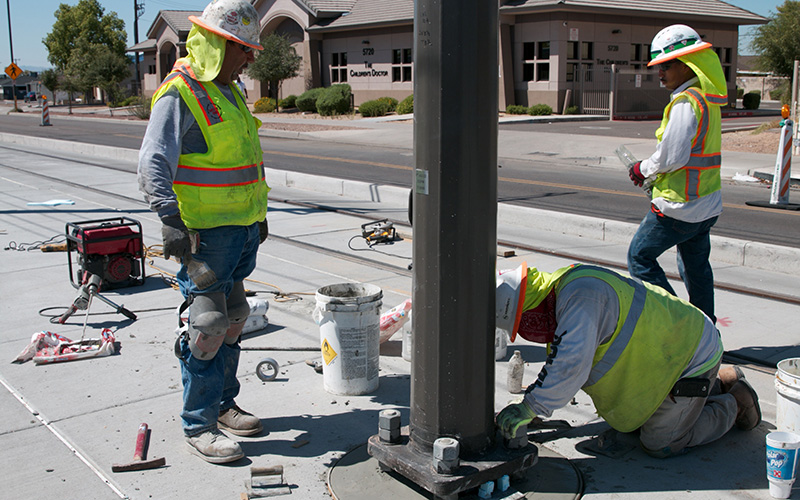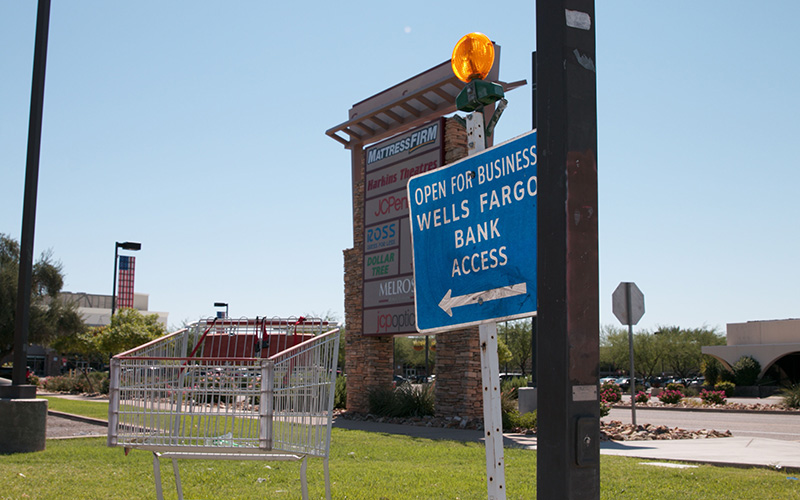
Workers construct a portion of the light rail line near 19th and Montebello avenues. (Photo by Amy Edelen/Cronkite News)

Businesses owners along 19th Avenue said they are struggling to attract customers because of reduced traffic lanes and increased construction. (Photo by Amy Edelen/Cronkite News)
While residents and city leaders celebrate the opening of Valley Metro’s light rail extension in Mesa and future transportation funding from recently passed Proposition 104, small business owners at the northwest end of the light rail said they feel left in the dust.
Since 2013, construction workers have dug holes, installed wires and laid tracks on Valley Metro’s 3.2-mile northwest light rail extension. Officials estimated the $300 million project, which includes stations at Glendale, Northern and Dunlap avenues, will bring 5,000 riders per day to northwest Phoenix.
However, until the extension is completed, businesses and customers will continue to endure delays in one of the busiest traffic areas in the region.
Businesses at the intersection of 19th and Northern avenues said they’re struggling to attract customers because of heavy construction and lane closures.
B’s Barber Shop opened more than 20 years ago. When owner Boris Baybachayev purchased the shop in 2008, the shop drew walk-in customers. Since construction, that doesn’t happen any more, he said.
“The only way we are surviving right now is off our regular customers,” Baybachayev said. “We have no foot traffic any more, no walk-ins, nothing like that.”
The shop went from five barbers working daily to two barbers, Baybachayev said.
Other business owners are anxious for construction to finish so traffic flow can return to normal, he said.
“We’re surviving. We’re just above water. It’s not easy. It’s tough,” Baybachayev said. “I can say hold on as long as you can. Hopefully, it will pay off in the long run.”
Tony Spahiu, the owner of Uncle Tony’s New York Pizza, said customers used to line up outside the door. He recently took out a bank loan to stay afloat.
“Before construction started, I did OK. I did very good. Since construction started, 65 to 70 percent of sales have dropped,” Spahiu said. “But now, over the last two months, it’s picking up a little bit, just to pay my bills.”
Spahiu bought the restaurant in a short sale. If he knew about the construction at the time, he said he would have thought twice about purchasing the property.
Both businesses said they received minimal help from the city or Valley Metro.
Business assistance is critical to Valley Metro’s construction process, and dedicated staff works with businesses to mitigate any problems, spokeswoman Susan Tierney said.
Since January 2013, Valley Metro has spent $39,000 to provide 237 access signs to businesses along the northwest light rail line. Additionally, Valley Metro offers the Metro Max Rewards program, which provides discounts to light rail riders from businesses along the line.
“If there is any kind of conflict, we are more than willing to work with those businesses with that dedicated staff and help respond and reassure them that we are here to support them,” Tierney said. “Because we know that when we are finished with construction, they are going to benefit from bringing more people to those storefronts.”
Valley Metro conducted a study indicating the light rail spurred more than $8.2 billion in economic development within a half-mile of the 28 light rail stations along the 20-mile route spanning from Phoenix to Tempe and Mesa. The cost to build the line was $1.4 billion, paid through federal, local and regional funding sources.
The northwest light rail extension was a sensitive utility project, Tierney said. Valley Metro had to move and replace 60-year-old infrastructure, which contributed to the increased construction in the area.
The first part of northwest light rail line is scheduled to open in March 2016.
The second phase, which will extend an additional 1.8 miles toward Interstate 17, will finish in 2026.
However, Valley Metro officials estimated workers would remove barricades and open the streetscape in the next 30 to 60 days to allow access to businesses effected by the construction, Tierney said.
Spahiu said he thinks he’ll remain open until Valley Metro opens the extension.
“They promised us (by) two months or the end of the year, it’s going to be completely done, and I pray to God that’s going to be true,” Spahiu said. “But if this keeps going in 2016 or further, I don’t think we’ll be open. I don’t have much power to stay open any more.”